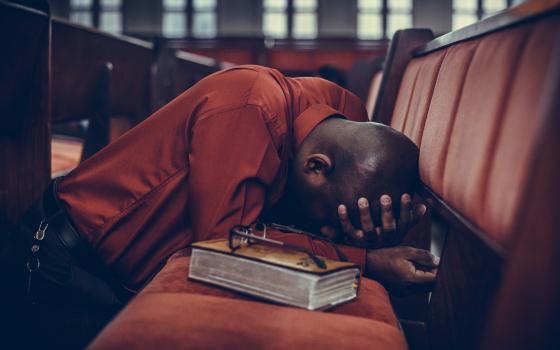
One domestic violence survivor used money from a financial settlement from her ex-husband to buy a tuk-tuk, a three-wheeled auto-rickshaw that she uses as a taxi, earning $15 a day. (GSR graphic/Olivia Bardo)
Editor's note: This story is part of Out of the Shadows: Confronting Violence Against Women, a series by Global Sisters Report and Global Sisters Report en español, focusing on how Catholic sisters respond to or are affected by this global phenomenon.
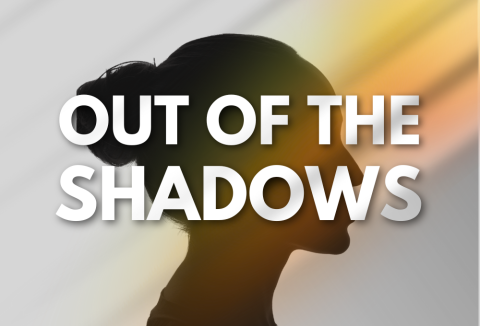
(GSR logo/Olivia Bardo)
In the bowl-shaped Birendranagar Valley surrounded by hills in Nepal, Nirmala Bastola is busy issuing tickets to visitors arriving at Bulbule Lake.
"Quite a busy day today," said Bastola, the 41-year-old single mother who has been working in the Surkhet district for seven years.
She credits the Sisters of Charity of Nazareth for helping her recover from her traumatic past.
Bastola, a domestic violence survivor, told Global Sisters' eport in late May that the nun's Navjyoti ("new light") Centre, helped her "become an independent woman."
Her monthly salary of 24,800 Nepali rupees ($175) working as a ticket seller supports her three young children. The work also "makes me forget about my past trauma and gives me new strength to go on with life for my children," she said.
Navjyoti Centre was established in 2000 in the district of Surkhet, 550 kilometers (342 miles) south of Nepal's capital, Kathmandu. It is a program of the Nepal Nazareth Society, the congregation's social welfare organization in Nepal.
The center offers legal support to domestic violence survivors and assists them in filing legal charges against the abuser and seeking compensation.
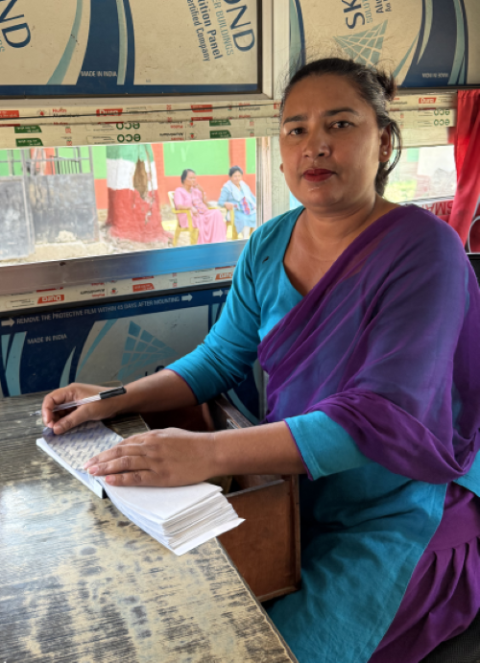
Nirmala Bastola said help from the Navjyoti Centre led her to "become an independent woman" after domestic violence. (Pragati Shahi)
"Most survivors don't know how to navigate the system," said Sr. Rosita Kavilpurayidom, the center's program coordinator since it started 25 years ago. "Our goal is to ensure they have fair access to justice. Legal support often becomes the key to breaking free."
In addition to legal help, the center also provides material aid, medical expenses, seed money for businesses and education support for children, the nun said.
Each month, the center helps an average of eight survivors like Bastola. The center has helped 670 survivors since launching its legal aid program in 2018, the nun said. At least 15 women have also received financial support to start small businesses and become self-sufficient, she said.
Domestic violence remains widespread in Nepal's patriarchal society, where women often have little or no influence in family or social decisions. Nepal Police reported 16,416 domestic violence cases in fiscal year 2024, including 81 homicides. Karnali Province, which covers Surkhet district, alone accounted for 880 cases in the same period.
A 2022 Nepal Demographic and Health Survey reported that 23% of women ages 15-49 had experienced physical violence, 8% had experienced sexual violence and 13% had experienced emotional abuse. Nearly 72% of women never seek help for domestic violence, the report said.
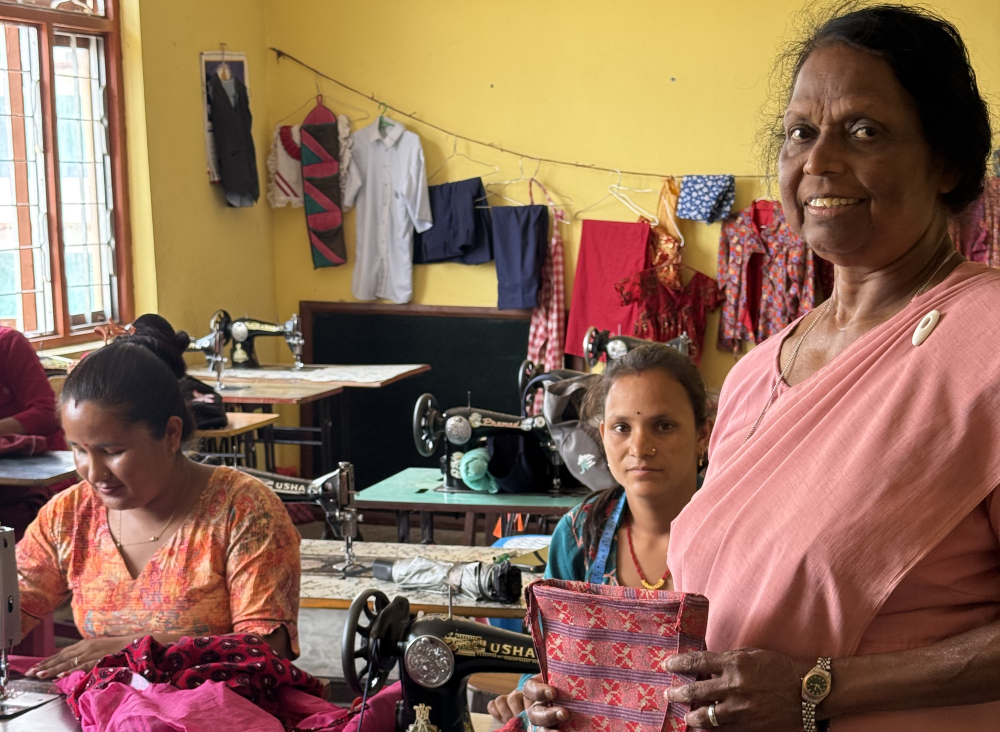
Sr. Rosita Kavilpurayidom poses with women participating in a six-month tailoring training provided by the Navjyoti Centre in Surkhet, Nepal. Kavilpurayidom, a Sister of Charity of Nazareth, has supervised the facility for 25 years. (Pragati Shahi)
"It becomes even harder to leave an abusive relationship without financial or family backing," Kavilpurayidom said.
Women with children find it especially difficult to leave abusive relationships without family support or financial independence, she said.
"Even when survivors do report abuse, many are pressured into reconciliation. Only a few pursue legal action," she said.
The financial burden that legal action imposes on survivors, combined with the long waiting period — courts take five to 10 years to process these cases — also forces women to stay in abusive relationships, the nun said.
Bastola's case, said Kavilpurayidom, was a typical example of teenage marriages and abusive husbands in Nepali villages, but she showed determination to escape it.
A resident of Chaukune village, Bastola was married off by her family at age 15. Her husband, a police constable, was emotionally, verbally, physically and sexually abusive toward her, she said.
"During pregnancy, I suffered from excessive bleeding and uterine infections, but I received no support. I was made to work like a slave without proper food," Bastola told GSR.
Two weeks after giving birth to her youngest son in 2009, she became seriously ill but was forced to walk for hours carrying vegetables to sell at the market, she said.
For the next six years, Bastola suffered from illness. In late 2015, her elder brother intervened and took her to Kathmandu for treatment. Meanwhile, her husband allegedly forged documents to send their children to an orphanage, citing missing parents and poverty.
After receiving treatment and returning home to Chaukune in late 2016, Bastola worked as a helper in a hostel kitchen and sought legal ways to get custody of her children.
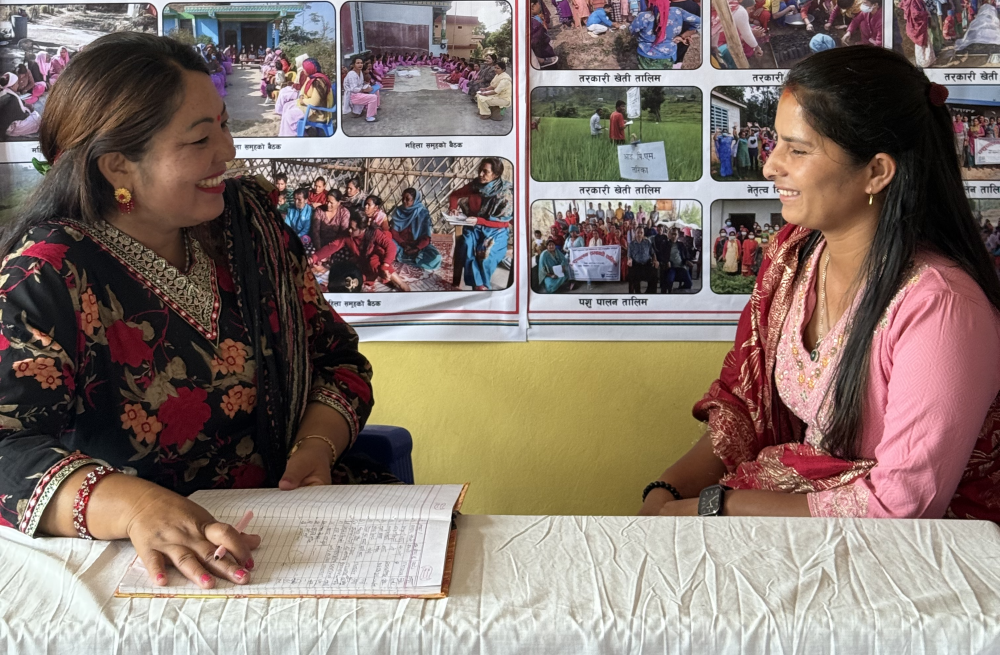
Jarmaya Thapa, left, a human rights officer with Navjyoti Centre in Surkhet, Nepal, sits with Jamuna Rokaya, a domestic violence survivor rebuilding her life. (Pragati Shahi)
The search led her to lawyer Geeta Koirala, who referred her to the Navjyoti Centre, Bastola said.
Koirala advocates for survivors in court, often offering free services or charging a small fee, said Jarmaya Thapa, a human rights officer at the Navjyoti Centre for over 20 years.
The center began providing legal help to women following repeated requests from social workers, community leaders and government officials, she said. Victims of domestic violence previously were referred to police and nongovernment organizations, but they often left without receiving the help they needed, she said.
"Victims come here broken, with nowhere else to turn. Here, they feel safe and supported," Thapa said.
Kavilpurayidom is deeply involved in each case. She consults with police, attends court mediations and supports survivors during hearings. "Her presence offers moral encouragement and eases the legal process," Thapa said.
Thapa said that about 95% of the 670 cases the center handled ended in divorce settlements, many of which included financial compensation.
Advertisement
Jamuna Rokaya, 30, from Chungad village in Surkhet, told GSR that she reported her domestic violence case to a human rights group in 2019. Still, she was repeatedly advised "to reconcile."
"I was depressed, silent, and had nowhere to go" because her abusive husband would promise "to change in front of mediators and police, but nothing changed," she said.
With the help of the Navjyoti Centre, Rokaya filed for divorce and property partition. In 2021, she secured a financial settlement from her ex-husband of 1 million Nepali rupees ($7,320) and monthly educational support for her daughter.
The money helped her buy a ttuk-tuk, a three-wheeled auto-rickshaw that she uses as a taxi, earning $15 a day. The rest of the money was deposited in a bank.
"I consider Ama (Kavilpurayidom) my second mother and the center my second home," Rokaya said.
Bastola thanked Kavilpurayidom for supporting her and her three children with food and accommodations.
"Without Ama's help, I wouldn't have gotten my life or my children back," she said. "I'm happy with where I am today."






